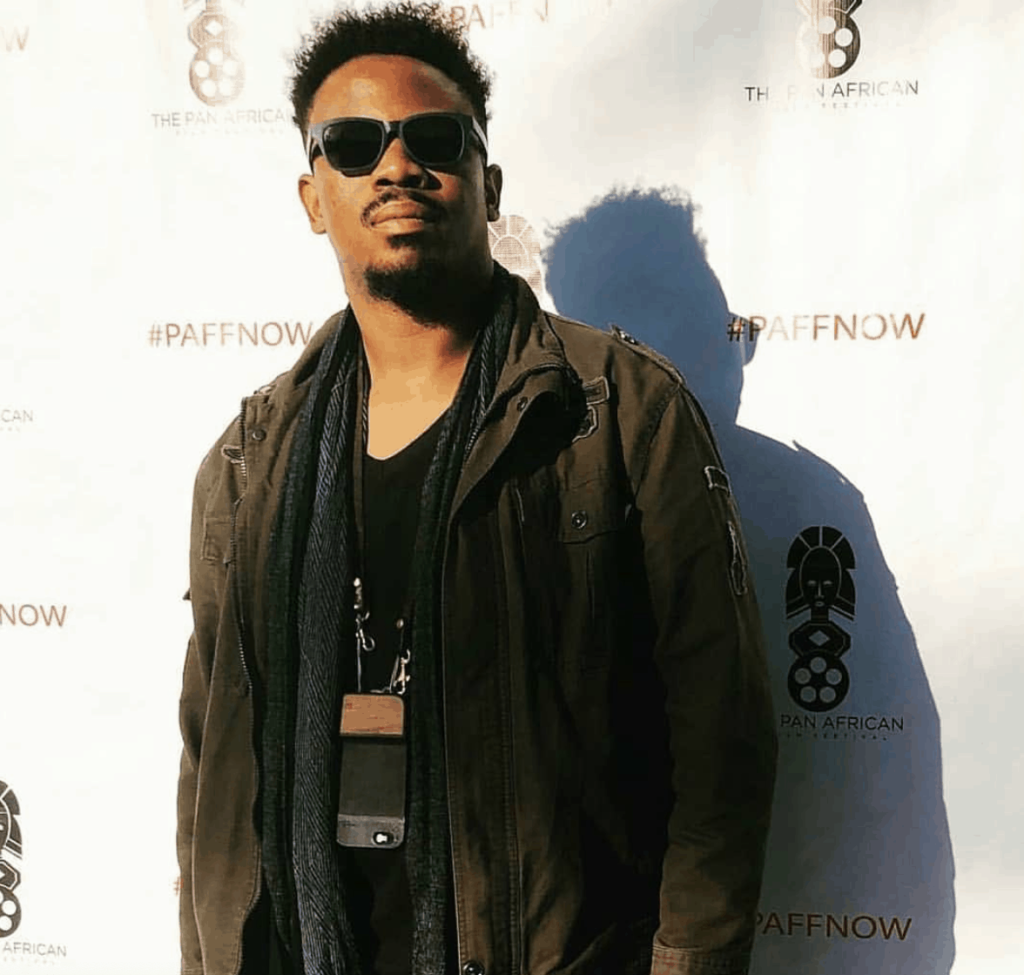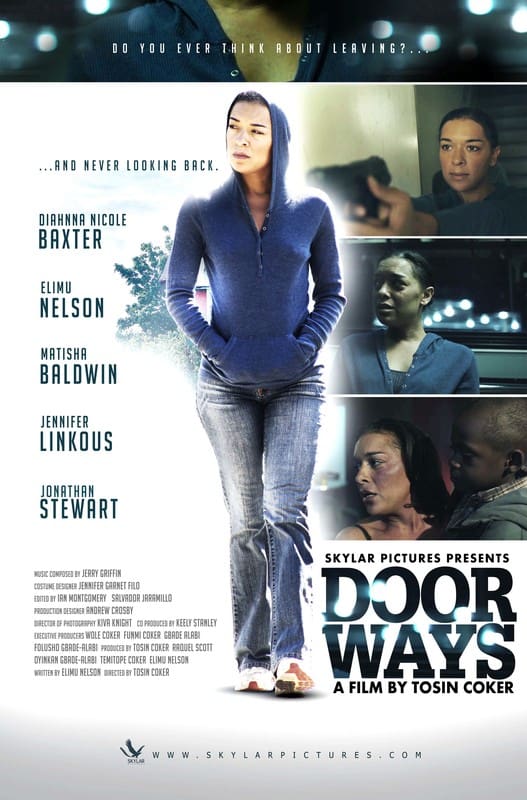Like many other film school students, Tosin Coker dreamed of getting his break and making it big straight out of college. His dream, in particular, seemed realistically close as he rode on a high from his successful thesis film for Academy of Art University, Doorways. Backed by support and encouragement from his instructors at the Academy’s School of Motion Pictures & Television (MPT), and having had a taste of the whole festival circuit experience, his confidence was unflappable.
And then he graduated into the real world only to realize that it was much bigger than he thought it was, and that he was not alone in having this dream.
“This was a truly rude awakening for me,” Coker acknowledged, “but also an opportunity to challenge myself to stand out in the crowd.”
And so he embarked on a path of reeducating himself in film, albeit this time, outside the classroom.

“I watched hundreds of movies and television shows, asked myself hundreds of questions pertaining to filmmakers’ choices, and dissected cinematic language and visual storytelling. I wrote several treatments, which I reworked over and over again to reflect my growth in understanding story format. I had to keep my goal in mind by reminding myself of that feeling I got when I knew this was what I wanted to do.”
From this, it can be deduced that Coker’s formula for success can seem to be drilled down to this simple equation: find out your passion, put in the hard work, check in with yourself to keep that passion alive.
There’s Always a Good Reason to Come Back
Coker grew up in Nigeria, but was actually born in San Francisco. His immigrant parents brought him back to their home country with them when he was a year old, and there he stayed for 13 years. After graduating from high school in 1997, he decided to move back to the United States.
“Nigeria is a place where you have to fit within the conventional occupational tracts of medicine, engineering, or law in order to be taken seriously, and I wasn’t interested in any of those careers.”
Instead, he knew that he wanted to be in film, and so enrolled at Academy of Art’s MPT program. It was what he called “the smartest idea” at the time, not only because he was already familiar with the city, but also because he knew the Academy to have “a great reputation for turning out independent filmmakers, which was intriguing to me because of the creative freedom it offered.”
For the rest of his stay in the Academy, he would have a creative guide, honing him intuitively and meticulously in having a genuine understanding of film, not only as an industry but also as a form of artistry.
Early Taste of Success Even Before Graduating
His thesis project, Doorways, starring Emmy Award winner Diahna Nicole Baxter and Elimu Nelson, went on to screen and compete in numerous domestic and international film festivals throughout 2011 to 2012, including The Pan-African Film Festival, and Texas Black Film Festival.

In 2015, it had its world television premiere on Aspire Networks ABFF Independent, after which it was then picked up by H-Studios in a global distribution deal. In 2019, Doorways won the AUDFEST FILM + INNOVATION FESTIVAL, emerging as the best from among over 4,000 short films submitted for consideration from all over the world.
The longevity of this thesis film, needless to say, is impressive. It’s been almost a decade since it first screened, after all, and yet it still continues to make waves, remains relevant. Perhaps, this is one of those things that, coupled with his time in the Academy and accumulated life experiences, lead to a perfect storm of success.
There is a lot you attain from film school. You learn the essentials of filmmaking and storytelling. You gain the technical knowledge required of the art form, but creativity, resourcefulness, and life skills like patience, endurance, and diligence come from life experiences.
Tosin Coker
In this exclusive interview, the multi-awarded, international filmmaker and Academy alum talks about his experiences in film school, his greatest fears coming into it, and support he received that helped him prepare for life after school and, eventually, success.
Can you tell us about your Academy experience?
Some of my fondest memories are from my time at the Academy. From the first semester where we took directing classes with Tracy Ward, I was enthusiastic and enthralled by the prospects of telling stories about real human interactions and experiences. I instantly engaged and cultivated friendships with fellow students, many of whom I still communicate with today.
The Academy opened me up to so many cultures, and educated me on many world issues through my interactions with various international students from diverse parts of the world. The cultural enrichment I received from these students contributed to my unique outlook on the cinematic artform as a whole. I realized that cinema transcends the borders of the United States over vast oceans, and the opportunities to tell stories are endless.

Were there specific lessons you learned at the Academy that you have consistently looked to for support in your career?
Yes, one of the major lessons learned would be from Tracy Ward’s directing classes, which I call upon one hundred percent of the time when working as a Director. The scene analysis process, which is the ability to look at a performance and in an instant break down the scene and find conflict, identify given circumstances, and understand the internal and external motivations behind a performance. It starts out as a technical and systematic exercise you learn in school, but eventually over time and with practice, it becomes intuitive.
What is the one thing you learned at the Academy that has proven most valuable to you in your career?
The ability to think creatively on my feet and to be resourceful and confident enough to improvise when necessary in order to get what I want, or something similar. Another thing would be the ability to trust my intuition as a filmmaker.
What is the single most important skill you learned at the Academy?
I feel the single most important skill I picked up in film school is the art of critical thinking and to always remain curious in order to never stop learning.
Do you have any stories or experiences you had at the Academy that might be helpful to those who are on the fence about attending?
After shooting my thesis, I struggled in post-production because I was still young and emotional about shots and scenes that made the pacing of the film slow and drawn out. I faced a lot of criticism and decided to meet with a member of the thesis review committee to get some advice on improving the film. However, the person I was supposed to meet with wasn’t available.
Fortunately for me, the President of the department at the time, Diane Baker, was passing by the receptionist desk and offered to take a look at the film. She watched the film and offered to mentor me through post production. She called in favors with reputable online posthouses in the city and enlisted some of the school’s department heads to work on the sound and offline editorial of the film. The film was selected at the school’s ‘Epidemic Film Festival’ and I went on to cultivate a fruitful professional relationship with Ms. Baker, who became one of my closest mentors and friends.

This point reiterates the fact that the school offers aspiring filmmakers a wealth of resources, contacts, and free career planning session services to guide their careers inside and outside of school that otherwise would come at exorbitant costs.
What was your greatest fear entering the Academy, and how did you overcome that fear?
Tosin Coker
My greatest fear was that I was too old to start film school at age twenty-six. I took a leap of faith because I just felt that it was what I would be most satisfied doing, and I am glad I did because I don’t think there is anything else that I find as fulfilling professionally as when I am in the throes of making a film.
Is there an instructor or mentor who helped you succeed here?
There were in fact several that I can think of, however the two people that stand out are Michael Helmy and Curran Engel who have both passed unfortunately. They were two people during my thesis review process that believed in me and encouraged me to dream, and that helped fuel my passion for filmmaking.
How has being a student at the Academy helped prepare you for life after school?
Once again, I believe this boils down to the ability to be inventive. This climaxed for me on the journey of making my first feature film, which I did with fellow Academy alums Temi Coker and Harold Escotet, who are also gifted with the ability to think on their feet, and were resourceful in tough circumstances.
Making a film like Lara and the Beat can subsequently be considered a story of triumph by way of trial by fire. It was extremely challenging due to the extreme limitations of shooting in the developing industry of Nollywood (Nigeria’s Motion Picture industry). We were made to confront and overcome challenges many would consider insurmountable in the independent filmmaking process where every second on the clock is money burning.
We had to deal with issues such as limited and irregular power supply, constant harassment by local authorities, and neighborhood thugs who threatened bodily harm and equipment seizure and were constantly making us shut down production in order to extort money from us. We also had to deal with hindrances in logistical and equipment resources. On one occasion, the law enforcement detained my producers and I after a resident working with the FBI in Nigeria made a complaint. On another occasion, we had to escape by way of a speedboat when some military officers tried to arrest us for shooting some B-Roll at the City Port.
Most of our pre-production was done onsite. All the blocking, production design choices, cinematography and costume decisions were made on location on the day of the shoot because we weren’t given approval to shoot in many locations until the day of the shoot in order for location proprietors to maximize on their fees.
I guess it is safe to say there was a lot of guerrilla filmmaking involved despite legally securing permits to restrict the extortion. Only filmmakers who have been trained to be resourceful could circumvent such obstacles, and the ability to do this was one I received from shooting spontaneous assignments at the Academy, such as the one where we were made to go around San Francisco in two hours to shoot a story on 8mm while editing in camera.

You commented that you miss the Academy. What did you mean?
The Academy was the apparatus that fanned a looming flame in me. I was excited to get up and go to the Academy each day because of the hunger of challenging myself creatively alongside fellow students I admired, and under the tutelage of instructors I respected. When you are out of school you sort of miss the access and emotional exhilaration of being able to work within the confines of an elaborate institution that caters to the various aspects of your craft. It is an experience that can’t be compared to anything in the real world except for perhaps working on a major studio lot, which comes close.
I miss the excitement of tackling the specific challenges of class assignments and the camaraderie and competitiveness amongst classmates. We challenged each other and helped build each other up. Also, the access the Academy grants you to a slew of mentors and the ability to rent equipment for free to test your skills, explore and creatively experiment.
I also miss the access it granted us to collaborate with students from other departments such as Animation, Visual Effects, Fashion and Graphic Design. It was a one stop shop for the filmmaker who saw this opportunity, and the best part was that these collaborative efforts didn’t cost us anything except maybe a cup of coffee and a collective dream of succeeding. Now I spend tens of thousands of dollars for the same access.
Another thing I miss is the vibrant city of San Francisco. Its artistic soul and magnificence always played a role in inspiring creative expressionism for me, and always found its way into becoming a character, whether central or supporting, in our stories.
What advice do you have for new Academy graduates as they begin their careers in film and television?
Be true to who you are and remain focused. Ask questions about life and your purpose. Look within yourself to see if this is what you want to do, and be prepared to dig deep into the sand to withstand whatever storms come your way on the journey to realizing your dreams.
What advice do you have for young filmmakers who are looking to make it in the industry? Is film school necessary? Or can you do it without college?
You don’t necessarily have to attend film school to make it in the film industry given the fact that many notable filmmakers never received a formal film school education.
However, film school provides you with the structured guidance through the entire filmmaking process from story development to screenwriting all the way through post production based on a planned curriculum. You come out knowing more about filmmaking than you did going in, having made great collaborations and friends, as well as industry connections with real work experience.
Tell us 5 things you have learned up to this point in your career that may be informative or inspirational to others.
- We are surrounded daily by stories worth telling. Pay attention.
- Never stop learning. To remain relevant, you must constantly evolve. Learning cannot be exhausted.
- Don’t second guess yourself. Believe in your dreams even if no one else does.
- Mistakes are inevitable. Not every single thing will go as planned. Don’t beat yourself up when things go wrong, learn from them and move on – quickly.
- Success is not a snapshot; it is the entire journey – take it all in.